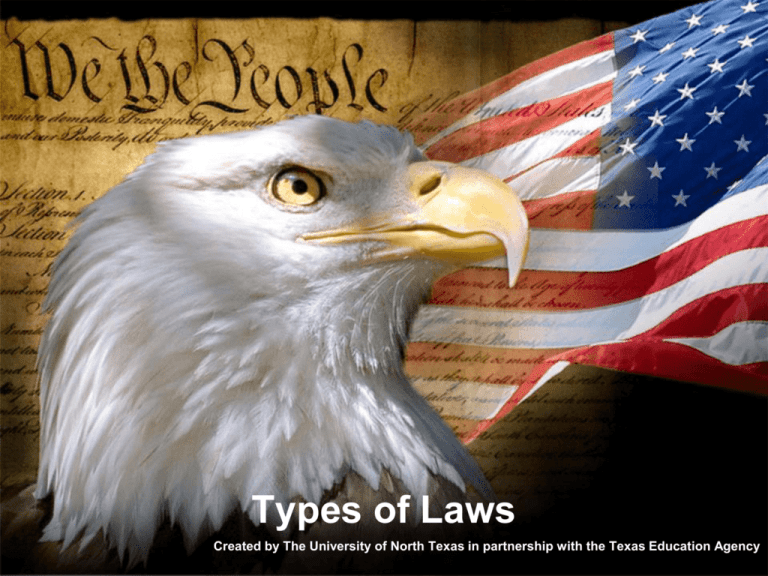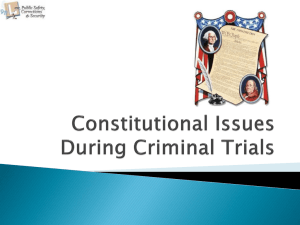
Types of Laws
Created by The University of North Texas in partnership with the Texas Education Agency
Sources of the Law
• U.S. Constitution
– Highest source of law
– Supreme law of the land
– All federal, state, and local laws cannot
conflict with the federal Constitution
UNT in partnership with TEA, Copyright © All rights reserved
2
Allocation of Power
• Federal Constitution allocates powers
between people and their governments.
• Bill of Rights-first ten amendments to the
U.S. Constitution.
• Intrastate commerce is regulated by the
state government.
• Interstate commerce is regulated by the
federal government.
UNT in partnership with TEA, Copyright © All rights reserved
3
U.S. Constitution Allocates
Power Between 3 Branches of
Government
Three Branches of Government
Executive
Legislative
Judicial
UNT in partnership with TEA, Copyright © All rights reserved
4
U.S. Constitution and
Congress
U.S. Constitution gives the federal
courts authority to determine which
laws passed by Congress are
constitutional
U.S. Constitution gives Congress the
power to ordain and establish the
courts in the first place.
UNT in partnership with TEA, Copyright © All rights reserved
5
Legal Regulation
Statuteslaws
enacted by
state or
federal
legislatures
Ordinanceslegislation
enacted by a
town, city, or
county board
or
commission
UNT in partnership with TEA, Copyright © All rights reserved
Case lawmade when an
appellate court
endorses a
rule to be used
in deciding
court cases
6
Legal Regulation
Stare decisis-doctrine that requires lower
courts to follow existing case law in
deciding similar cases
Administrative agenciesgovernmental bodies formed to carry
out particular laws
Social Security Administration
State Division of Motor Vehicles
County Zoning Commission
UNT in partnership with TEA, Copyright © All rights reserved
7
Validity Test
U.S. Constitution is the supreme law
of the land.
Statutes must be constitutional to be
valid.
When a court rules a statute invalid,
the legislative body may opt to
rewrite the statute.
UNT in partnership with TEA, Copyright © All rights reserved
8
Major Types of Laws
Criminal
Laws
Civil Laws
• Laws to
provide
remedy for
wrongs
against
individuals
• Group of
laws that
defines and
sets
punishments
for offenses
against
society
UNT in partnership with TEA, Copyright © All rights reserved
Procedural
Laws
• Group of laws
that define the
methods for
enforcing legal
rights and
duties
9
Major Types of Laws
Substantive Law
• Group of laws
that define
rights and
duties
Business Law
• Group of laws
that governs
business
situations and
transactions
UNT in partnership with TEA, Copyright © All rights reserved
Uniform
Business
Laws
• Uniform
Commer
cial Code
– widely
adopted
uniform
business
law
10












